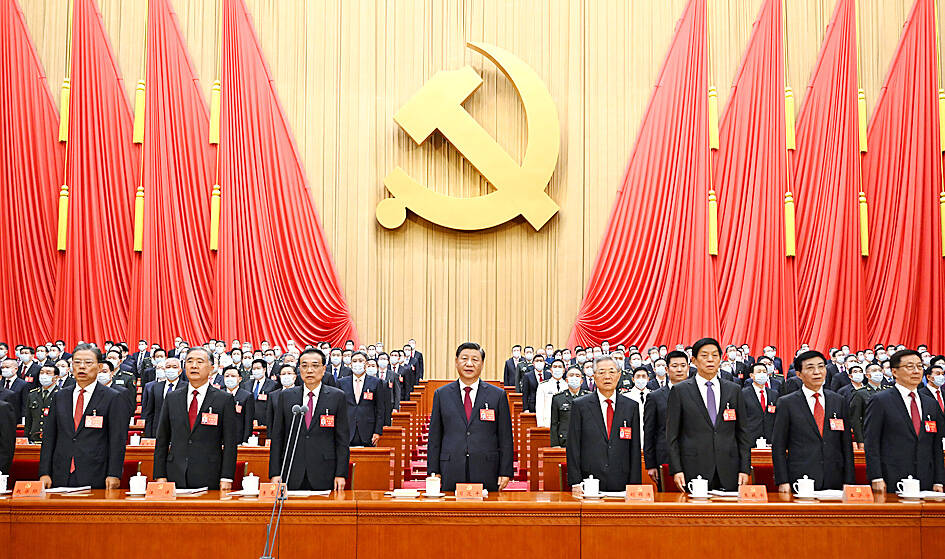Pursuing unification with Taiwan is likely to be high on the agenda during Chinese President Xi Jinping’s (習近平) third five-year term that began earlier this year, Taiwan’s Ministry of National Defense said in a report.
The ministry based its analysis on three events that have taken place since the 20th National Congress of the Chinese Communist Party (CCP) in October last year cemented Xi’s grip on power in the party following a major leadership shuffle.
At the congress, the CCP wrote the “one country, two systems” formula into its party constitution, which sets more definitive guidance on the party’s Taiwan policy, the ministry said.

Photo: EPA-EFE / XINHUA / LI XUEREN
The concept was first proposed by the late leader Deng Xiaoping (鄧小平) in the 1970s to promote the policy of peaceful unification with Taiwan.
Another indication was the first speech given by Xi at the 14th National People’s Congress, after he was elected for an unprecedented third term as president, in which he vowed to lead the CCP to “solidly” promote the “great cause of national reunification,” it added.
The report added that the lineup of the CCP’s 20th Central Military Commission (CMC), China’s highest national defense organization, also suggested Xi considered unifying with Taiwan to be at the top of his third term agenda.
Xi has prioritized generals with expertise in military technology, experience in combat and handling matters related to Taiwan, the ministry said.
It added that He Weidong (何衛東) was appointed to hold one of the two CMC vice chairmanships as he was well-versed with the People’s Liberation Army’s (PLA) military readiness, which would be an asset in the event of a cross-strait conflict.
His most recent post was as commander of the PLA’s Eastern Theater Command, during which he was responsible for Taiwan and East China Sea contingencies.

SHIPS, TRAINS AND AUTOMOBILES: The ministry has announced changes to varied transportation industries taking effect soon, with a number of effects for passengers Beginning next month, the post office is canceling signature upon delivery and written inquiry services for international registered small packets in accordance with the new policy of the Universal Postal Union, the Ministry of Transportation and Communications said yesterday. The new policy does not apply to packets that are to be delivered to China, the ministry said. Senders of international registered small packets would receive a NT$10 rebate on postage if the packets are sent from Jan. 1 to March 31, it added. The ministry said that three other policies are also scheduled to take effect next month. International cruise ship operators

HORROR STORIES: One victim recounted not realizing they had been stabbed and seeing people bleeding, while another recalled breaking down in tears after fleeing A man on Friday died after he tried to fight the knife-wielding suspect who went on a stabbing spree near two of Taipei’s busiest metro stations, Taipei Mayor Chiang Wan-an (蔣萬安) said. The 57-year-old man, identified by his family name, Yu (余), encountered the suspect at Exit M7 of Taipei Main Station and immediately tried to stop him, but was fatally wounded and later died, Chiang said, calling the incident “heartbreaking.” Yu’s family would receive at least NT$5 million (US$158,584) in compensation through the Taipei Rapid Transit Corp’s (TRTC) insurance coverage, he said after convening an emergency security response meeting yesterday morning. National

PLANNED: The suspect visited the crime scene before the killings, seeking information on how to access the roof, and had extensively researched a 2014 stabbing incident The suspect in a stabbing attack that killed three people and injured 11 in Taipei on Friday had planned the assault and set fires at other locations earlier in the day, law enforcement officials said yesterday. National Police Agency (NPA) Director-General Chang Jung-hsin (張榮興) said the suspect, a 27-year-old man named Chang Wen (張文), began the attacks at 3:40pm, first setting off smoke bombs on a road, damaging cars and motorbikes. Earlier, Chang Wen set fire to a rental room where he was staying on Gongyuan Road in Zhongzheng District (中正), Chang Jung-hsin said. The suspect later threw smoke grenades near two exits

The Forestry and Nature Conservation Agency yesterday launched a gift box to market honey “certified by a Formosan black bear” in appreciation of a beekeeper’s amicable interaction with a honey-thieving bear. Beekeeper Chih Ming-chen (池明鎮) in January inspected his bee farm in Hualien County’s Jhuosi Township (卓溪) and found that more than 20 beehives had been destroyed and many hives were eaten, with bear droppings and paw prints near the destroyed hives, the agency said. Chih returned to the farm to move the remaining beehives away that evening when he encountered a Formosan black bear only 20m away, the agency said. The bear